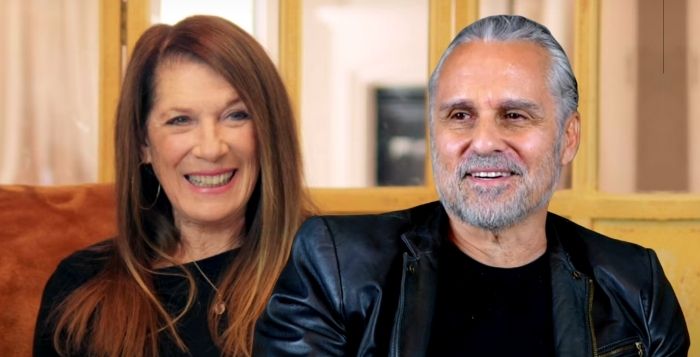Maurice Benard reached into his back pocket and pulled out a little General Hospital days-of-old magic this week on his video podcast State of Mind as former executive producer Wendy Riche graced the couch across from his. The two regaled the tale of Benard’s arrival on the iconic soap opera as Sonny Corinthos, subsequent mental breakdown, and the award-winning AIDS storyline that would move fans and leave a lasting effect on the genre.
Wendy Riche on Maurice Benard’s Rocky First Days
Riche recalled her impression of his state of mind (no pun intended) in the early days, “You were vulnerable,” she explained. “You were very vulnerable. When Paula [Benard’s wife] called and said, ‘Maurice can’t. I think you need to talk to him,’ because she knew, because she always knows, right? Exactly what you need. And you came up and spoke with us. You were broken and vulnerable.”
“Cari Shayne [Karen Wexler] was on my lap, and her character was telling me about the stepfather who abused her.” Benard described the trigger point. “In that moment, the camera was right there [gesturing in front of him], I start crying. And I start figuring out that I was abused. Maurice. Forget Sonny. It must have been interesting to the audience, because I am supposed to be this bad, mean, ugly guy, and he’s emotional, almost crying. She’s crying. That’s not how it is supposed to be.”
Under most circumstances that could have been the beginning of the end, but Riche detailed what happened next, “What I knew, what I hoped, is that what you needed was support and understanding. That we were there for you. I remember saying to you that you would not be here if you could not do this. You kept saying, ‘I can’t do this. I can’t do this.’ Of course, you could. You just didn’t think so in that moment. What you needed was the hands to hold you up, which we all need, to say that you can do this.”
Stone And Robin: Tackling The AIDS Crisis
The two old friends and colleagues talked about the beginning origins of the Stone and Robin storyline, beautifully portrayed by Michael Sutton and Kimberly McCullough, and how it evolved and gained momentum.
“First of all, Everything I do has an impact. AIDS is hideous,” Riche shared. “It was a horrible time and I wanted to do something. We had this great forum, an audience that loved these characters. What better way to tell a story than through these great characters. When Claire [Labine] came on, after we talked about all of the characters, I said I really want to do something like this. I really want it to be about a beloved character. It is important for it to not be a new gay character brought on or somebody who is gay and we are just realizing it because people won’t get it the way they can get it and need to.”
“She called me, we were on our way back from some retreat, and she brought up Stone, Jagger’s [Antonio Sabato, Jr.] brother, and we brought up the affair with Robin,” the producer continued. “We talked for like three hours on the phone from Norwich, Connecticut, to Brooklyn to Park Slope. Then we called ABC and talked about it. I believe it was Pat Fili [Patricia Fili-Krushel] at the time. Tough, brave, and kind. A girl from Queens. She was very supportive.
“So Claire wrote, and the team wrote beautiful material,” she continued. Wendy Riche then described the downside to the trailblazing storyline, “Some viewers dropped out. We did some publicity before it aired. A lot of publicity. It would be an interesting discussion from a business standpoint, whether we should have just thrown it out there [the story] and not done the publicity and whether the viewers would have just stayed with it. But a lot of viewers tuned out because they didn’t want to see AIDS. Like 100,000 viewers stopped. And there was the OJ Trial.
“But more importantly, the kind of mail we got,” she added, sharing the positive effects of the story. “To this day, people will write that ‘you saved my life,’ or ‘you saved my brother’s life,’ ‘I was able to come out,’ ‘I was able to accept myself.’ That’s priceless. You can’t buy that. That is the gift of this work.”
More juicy morsels from the feast of General Hospital history such as the evolution of Sonny and what makes the character so loved, the storyline shot in Puerto Rico with Brenda Barrett (Vanessa Marcil), and Maurice Benard’s lightbulb moment for Marcil, Riche’s rewarding work on the award-winning web series The Bay, and the sense of loss they both share. About 10 minutes before the end of the 39-minute interview, there is a tribute to Benard’s father, and the two discuss their shared experiences with grief.
Fans won’t want to miss the full episode with General Hospital’s former Executive Producer Wendy Riche. Former consulting producer Shelley Curtis also joined Benard this week and had a lot to say about her time with Gloria Monty, Benard’s beginnings, and much more, check back tomorrow for a recap of that interview or watch it here. For Michael Sutton’s (Stone) take on the storyline, click here.
Follow Maurice Benard on Twitter, Instagram, and for more episodes of State Of Mind go to the main page of the video podcasts here.
General Hospital (GH) airs weekdays on ABC. Check your local listings for airtimes. For more about what’s coming up in Port Charles, check out all the latest that’s been posted on General Hospital spoilers, and for an in-depth look at the show’s history, click here.
Today on @mbstateofmind I’m joined by @canyoncatz and @ShelleyLitvack.
Wendy and Shelley saved my career when I had a breakdown 3 weeks within starting my role on @MauriceBenard as Sonny.
Watch at 1pm EDT
Part 1: https://t.co/paNkjYiH7C
Part 2: https://t.co/HxmtvAowNA pic.twitter.com/3aDx8ZpPHZ— Maurice Benard (@MauriceBenard) December 5, 2021
